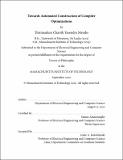| dc.contributor.advisor | Saman Amarasinghe. | en_US |
| dc.contributor.author | Mendis, Thirimadura Charith Yasendra. | en_US |
| dc.contributor.other | Massachusetts Institute of Technology. Department of Electrical Engineering and Computer Science. | en_US |
| dc.date.accessioned | 2021-01-06T20:17:20Z | |
| dc.date.available | 2021-01-06T20:17:20Z | |
| dc.date.copyright | 2020 | en_US |
| dc.date.issued | 2020 | en_US |
| dc.identifier.uri | https://hdl.handle.net/1721.1/129300 | |
| dc.description | Thesis: Ph. D., Massachusetts Institute of Technology, Department of Electrical Engineering and Computer Science, September, 2020 | en_US |
| dc.description | Cataloged from student-submitted PDF of thesis. | en_US |
| dc.description | Includes bibliographical references (pages 153-168). | en_US |
| dc.description.abstract | Compilers are the workhorse that bridge the gap between human-readable and machine-executable code.e ultimate goal of a compiler is to find a legal translation that provides the most optimized machine code sequence for a given hardware platform. However, the diversity of modern programs, along with the advent of new and complex hardware architectures, has strained the capabilities of current compilers, making development and maintenance of automatic program optimizations in compilers exceedingly challenging. Despite this, compiler optimizations are still hand-crafted, using technology that existed decades ago. In this thesis, we show how to move towards more automated methods of constructing compiler optimizations, using compiler auto-vectorization as an example. Modern compilers perform vectorization using hand-crafted algorithms that typically only find local solutions under linear performance models. | en_US |
| dc.description.abstract | First, we present goSLP, a framework that uses integer linear programming to find a globally pairwise-optimal statement packing strategy to achieve superior vectorization performance. Next, we discuss how we can automatically learn how to vectorize. We present Vemal, the first end-to-end learned vectorizer, which eliminates the need for hand-writing an algorithm. The key is to formulate the optimization problem as a sequential decision making process in which all steps guarantee the correctness of the resultant generated code. Not only does Vemal reduce the need for expert design and heuristics, but it also outperforms hand-crafted algorithms, reducing developer effort while increasing performance. Finally, we show how we can use data to learn non-linear performance models that are better than the complex and incorrect hand-crafted models designed by experts, to enhance the decision procedure used in Vemal. | en_US |
| dc.description.abstract | We present Vemal, the first learned cost model for predicting the throughput of x86 code. Ithemal more than halves the error-rate of complex analytical models such as Intel's IACA. Both Vemal and Ithemal achieve state-of-the-art results and pave the way towards developing more automated and modern compiler optimizations with minimal human burden. | en_US |
| dc.description.statementofresponsibility | by Thirimadura Charith Yasendra Mendis. | en_US |
| dc.format.extent | xix, 168 pages | en_US |
| dc.language.iso | eng | en_US |
| dc.publisher | Massachusetts Institute of Technology | en_US |
| dc.rights | MIT theses may be protected by copyright. Please reuse MIT thesis content according to the MIT Libraries Permissions Policy, which is available through the URL provided. | en_US |
| dc.rights.uri | http://dspace.mit.edu/handle/1721.1/7582 | en_US |
| dc.subject | Electrical Engineering and Computer Science. | en_US |
| dc.title | Towards automated construction of compiler optimizations | en_US |
| dc.type | Thesis | en_US |
| dc.description.degree | Ph. D. | en_US |
| dc.contributor.department | Massachusetts Institute of Technology. Department of Electrical Engineering and Computer Science | en_US |
| dc.identifier.oclc | 1227704503 | en_US |
| dc.description.collection | Ph.D. Massachusetts Institute of Technology, Department of Electrical Engineering and Computer Science | en_US |
| dspace.imported | 2021-01-06T20:17:19Z | en_US |
| mit.thesis.degree | Doctoral | en_US |
| mit.thesis.department | EECS | en_US |
